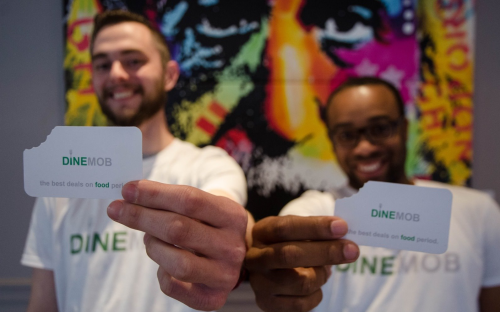Legions of ventures have emerged since the global financial crisis, given a head of steam by the rock star founders behind the likes of Lyft and Lending Club, and the sky high valuations of start-ups such as Airbnb and Uber.
An unlikely cluster of this innovation is the education sector, long shunned by entrepreneurs who argue formal learning is a ghastly way to become a business founder.
But top institutions such as Stanford, MIT and Wharton want to challenge this notion with new courses and support for the rapidly growing number of student led start-ups.
Simon Stockley, senior teaching faculty in entrepreneurship at Cambridge Judge Business School, says: “People can be taught how to create or spot opportunities and how to build a business model to create, deliver and capture value from those opportunities.”
But he compares the practise to the medical profession. “You can teach the subject but if there is no passion and drive, you’ll end up with a lousy doctor,” he says.
The drive to educate entrepreneurs has enabled many start-ups to join the “unicorn” club — those that have achieved a valuation of $1 billion.
Cambridge University has produced at least 14 companies valued at $1 billion, including ARM, the listed semiconductor business which powers 95% of the world’s mobile phones. Many of these ventures have come from research but start-ups have benefitted from funding, mentorship and education globally.
William Peregoy, founder of DineMob, an app that helps restaurants fill during off-peak hours, says: “An MBA is what you make of it.” The Dallas based entrepreneur graduated from Hult International Business School in 2012 and launched DineMob this year. “The big picture for DineMob is already laid out in my head and my confidence for handling all the future steps and growing this company is through the roof — because I can draw on the experience,” William says.
Bethany Coates, assistant dean at Stanford Graduate School of Business, is stunned by the insatiable appetite for entrepreneurship. “The demand for entrepreneurial education has grown significantly, but also interest in entrepreneurship as a career path has been embraced in a way like never before,” she says.
However, sceptics are everywhere. Brent Hoberman, chairman of Founders Forum, Made.com and Smartup.io, argues crafting an academic program for entrepreneurs is “virtually impossible”. “Some of the most important qualities in an entrepreneur are tenacity, determination and an ability to embrace uncertainty and risk. Business schools can’t teach that,” he writes.
The problem, according to Silicon Valley’s Steve Blank, creator of the “lean start-up” model, is that business schools treat entrepreneurship as a technical subject, rather than a creative one — practical experiences are key
“Entrepreneurship is both technical and creative,” says Jeff Skinner, executive director at the Deloitte Institute of Innovation and Entrepreneurship at London Business School.
“There are great, evidence based methodologies for creating an enterprise... These methodologies work well in increasing the odds of success, pointing students at what is important and helping them to avoid obvious mistakes,” he says. But, “creativity is equally a key ingredient”.
Academic institutions see a value in employing established entrepreneurs to teach the subject to nascent founders.
Nick Badman, chairman of the Centre for Entrepreneurship at London’s Cass Business School, says: “Entrepreneurship is an intensely practical pursuit and so help from those who have either done it, parts of it, or observed it very closely tends to be of most value.”
Bill Aulet, managing director of the Martin Trust Center for Entrepreneurship at MIT Sloan School of Management, talks of the “positive feedback loop” that can be fostered on campus.
“People see role models and they think, “Yes, I can do it”, and they go about trying to do it with great conviction,” he says. If they’re more successful, they become idols for the next class of students.
In some cases, schools are recruiting successful founders to mentor up-starts on campus like venture capitalists, such as Darrin Disley, the chief executive of London listed biotech group Horizon Discovery, who is an “entrepreneur in residence” at Cambridge Judge.
“Some of these coaches are serial entrepreneurs and CEOs of relatively big organizations. They don’t only coach the students, but also bring them in contact with potentially valuable investors,” says Justin Jansen, professor of corporate entrepreneurship at Rotterdam School of Management.
A benefit that many start-ups are enjoying, compared with immediately after the financial crisis, is that it has become easier to access financing.
Diane Morgan, associate dean of programs at Imperial College Business School, says the barriers to starting a business are lower than they used to be.
“There are more and more opportunities to enter incubator or accelerator programs and gain access to funding…Many of these are increasingly targeting students,” she says.
Cambridge Judge’s Simon highlights the SEIS and EIS UK government tax relief schemes for SME investors. But he adds: “The real issue is growth capital. We are worried about this.” “The start-up movement in the UK is not as developed as that of Silicon Valley,” notes Maria Nikolou, senior program manager at the Entrepreneurship Centre of Oxford Saïd Business School. “[But] many of the important pillars are now in place,” she says.
The burning issue many business schools have so far failed to address is how to cater to entrepreneurs who see committing themselves to months or years of full-time study as anathema.
“There is increasing interest in blended learning and weekend events,” says Dr Shailendra Vyakarnam, director of the Bettany Centre for Entrepreneurship at Cranfield School of Management. “Technology adoption, especially the internet, is the key and, to be honest, we have not seen anything of the power of that as yet in education,” he says.
University for entrepreneurs has its doubters, but for a growing number of founders, an investment in education is paying dividends.
Alexander Afanasyev, co-founder of digital talent solutions business bhive, says the value of an MBA as a start-up founder is the ability to adapt quickly to change. “Being an entrepreneur not only means being flexible, but also being capable of facing challenges and pivoting your business model,” says the IE Business School graduate.
Many, however, see entrepreneurship as a skill best acquired by doing. After all, the likes of Gates, Jobs and Zuckerberg are infamously college drop outs.
Student Reviews
Bayes Business School
RECAPTHA :
7a
91
42
87








